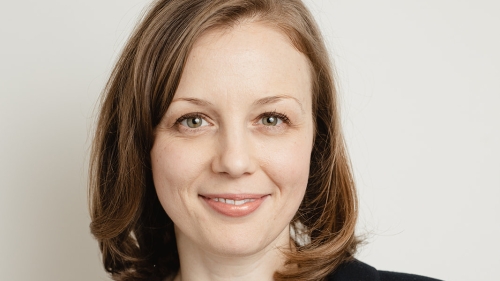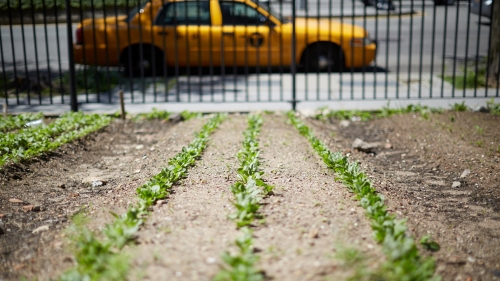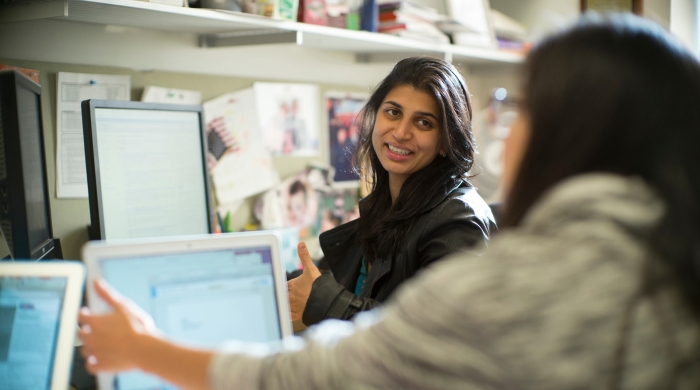Jaclyn Rohel graduated with her PhD in Food Studies in 2018. Read on to learn more about Jaclyn's professional background, experience in the PhD program, and her recent entrance into a postdoctoral fellowship at the University of Toronto’s Culinaria Research Centre.

What was your professional background before coming to NYU?
I did an undergraduate degree in philosophy at the University of Toronto. During some of that time I also worked in the hospitality industry, doing front of house service in a few restaurants and bars. I later pursued a master’s degree in philosophy at the University of Alberta. While I was there, I took a new course on the philosophy of the body and also co-authored an article with a professor and another student on cross-disciplinary teaching and learning. I wrote my MA thesis on ethics, the senses, and taste. That training enabled my transition to food studies; it taught me how to connect critique with action, and thinking with doing.
What inspired you to pursue your PhD and research interests?
Following my MA, I made the leap to the field of food studies. I was looking for an opportunity to work across the humanistic social sciences and within a community that pursued different forms of knowledge-making, particularly around foodways and global culture. At NYU, my research came to focus on social issues at the intersection of cities, globalization, and the marketplace.
I was especially drawn to the interdisciplinarity of the program, as I was able to take graduate courses in food studies in my home department and also pursue coursework in allied fields. Within the Food Studies program, I took classes in global history (with Professor Amy Bentley), urban immigration (with Professor Jennifer Berg), culinary theory and popular culture (with Professor Fabio Parasecoli), and systems and social change (with Professor Marion Nestle). I also took many classes in the Department of Media, Culture, and Communication, including a course on media and migration at NYU London (with Professor Radha Hegde), which very much shaped the trajectory of my research. The Food Studies program gave me the tools to bring cultural theory together with a broader concern for systems of food production, distribution, consumption, regulation, and transformation; the School’s global research and teaching sites helped me to execute it.
What was the most influential part of your experience in the PhD program?
The most influential part of my experience in the PhD program was the community. I learned a tremendous amount from my peers and mentors in the department, as well as from various working groups and collaborations that extended beyond the university’s walls.
In the early days of my PhD, my advisor, Professor Krishnendu Ray, equipped me with an interview schedule as a research assistant for his project on immigrant entrepreneurs in New York’s restaurants. I managed interviews with restaurateurs across the city, and this kind of empirical research was new to me having come from philosophy. That field experience, combined with my participation in a cross-sectoral working group called Menus in the Media at NYU’s Institute for Public Knowledge, set me on a path towards the study of food at the intersection of the marketplace and urban culture.
Following candidacy, I helped develop a global collaboration on cities, food, and labor. Our work at NYU focused on urban liveliness and the livelihoods of the people that feed cities through street vending and microenterprise. Between 2014 and 2018 we hosted a few international symposia, eventually helped along by an NYU Provostial Global Seed Grant for Collaborative Research. "City Food and Sustainability in India," the MA course that I co-led with Krishnendu Ray in 2016, became part of our broader effort to forge transformative connections between sustainability, markets, culture, and social advocacy through both research and experiential learning. Throughout this time, I was also writing up my dissertation; I really appreciate having had the opportunity to develop my own research alongside a community of people who were working on related topics. My dissertation was a case study of a contested street food in a globalizing city; it looked at the ethics of hospitality – of welcoming and of being welcomed by the other – by telling a story about social structures through innovation, modernity, and cross-cultural encounter in London. In that work, I drew on issues and methods of analysis from the fields of urban studies, media and cultural studies, philosophy, history, and sociology.
What would you consider to be the greatest accomplishment(s) of your career so far?
I can certainly point to different benchmarks and research projects: the dissertation, being one, which was multimethod in its approach, as well as my more collaborative scholarship. You can read some of my published work in Gastronomica and Global Food History, for example. But I’d say that my greatest accomplishment is the ability to navigate my work as a continually evolving process within academia and also beyond it. I work across disciplines; I also increasingly seek out modes of communication and community connection to generate new opportunities for positive social impact.
Can you tell me about the work you’re doing now?
I’m just commencing a Postdoctoral Fellowship at the University of Toronto’s Culinaria Research Centre. I’ll be collaborating on a few projects there, including one on markets and urban resiliencies. I’ll also be contributing to a large project called Feeding the City: Pandemic and Beyond; it analyzes the impact of COVID-19 on Toronto’s food system and the local community responses to food insecurity under the conditions of the pandemic. Additionally, I continue to serve as Reviews Editor at Gastronomica, an international journal that publishes translational work in Food Studies for a broad readership.
Do you have any advice for folks interested in a similar career path?
In the course of their research, I would encourage students to focus not only on knowledge production, but also to set goals for knowledge mobilization. What could one do with the knowledge that they produce in the course of their studies? How might one put their research to work? This was one of the key advantages of doing a PhD in a field like Food Studies. In my experience, an interdisciplinary PhD rewards initiative, creativity, and an openness to new opportunities, within the University and beyond.
About the PhD in Food Studies

Nutrition and Food Studies
411 Lafayette Street, 5th Floor
New York, NY 10003
Phone: 212-998-5580
Email: nutrition@nyu.edu

